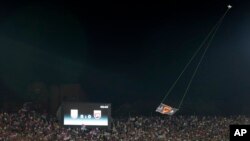It was meant to be a rare gathering of the leaders of the western Balkan countries bidding to join the European Union, a moment of high symbolism two decades since the wars that tore apart Yugoslavia, but old enmities again got in the way.
Leaders of Serbia, Kosovo, Bosnia, Macedonia, Montenegro and Albania were all invited to meet under the auspices of the Trilateral Commission, a Western reflection group, at a Saturday conference in Belgrade, capital of Serbia and once Yugoslavia.
Albania's prime minister, Edi Rama, declined his invitation in the wake of an abandoned Oct. 14 soccer match between Serbia and Albania in Belgrade, when brawls broke out on the pitch after a remote-controlled drone trailing a flag of “Greater Albania” flew over the stadium, triggering a pitch invasion.
Rama, in agreement with his Serbian counterpart, had already postponed an Oct. 23 bilateral visit for Nov. 10. It will mark the first visit to Serbia by an Albanian leader in 68 years, hailed as a new chapter in relations marred by tension over Serbia's majority-Albanian former Kosovo province.
The soccer incident triggered a war of words between Tirana and Belgrade, as well as attacks on bakeries owned by Albanians in Serbian towns, showing how ethnic and national resentments in the region continue to lurk just below the surface.
That was only the start of the unraveling of a session due to focus on “west Balkans candidate countries on their path to European Union accession” - an increasingly remote prospect with the EU having just declared a five-year moratorium on further enlargement.
'Not for want of trying'
Kosovo's president, Atifete Jahjaga, whose visit would have marked the first to Serbia by a head of state of an independent Kosovo, also bowed out, citing a political crisis at home. Kosovo, which is mainly ethnic Albanian, broke away from Serbia in war in 1999 and declared independence in 2008.
“I decided to stay in Kosovo at this critical time,” she told the Kosovo daily Tribuna.
“I never take these meetings as something easy, because they are not easy. But I believe in Kosovo's statehood... and I will never be afraid to face anyone in Belgrade, in Pristina or elsewhere,” Jahjaga said.
Belgrade has not officially recognized Kosovo's independence, which came almost a decade after an 11-week NATO air war in 1999 that drove out Serbian forces which had waged a bloody counter-insurgency, driving hundreds of thousands of people into neighboring Macedonia and Albania. But Kosovo's foreign minister, Enver Hoxhaj, visited Belgrade last week in a step towards practical cooperation.
“We have to close once and forever the conflict with Serbia, because this conflict continues to hold Kosovo and the whole region hostage,” Jahjaga said.
The chairman of Bosnia's multiethnic presidency, Muslim Bosniak Bekir Izetbegovic, also dropped out of the Belgrade meeting after, sources said, the organizers invited the president of the Bosnian Serb republic, Milorad Dodik, who wants to break away from Bosnia.
The absence of the three leaders means only the majority Orthodox Christian countries will be represented. There will also be no official representative of Croatia, which has already joined the EU in July 2013 after fighting against Serb rebels to break free of Yugoslavia in 1991-95.
Jovan Kovacic, chairman of the Serbian group in the Trilateral Commission and a member of the organization's executive committee, told Reuters: “It was not for want of trying by the organizers.”





